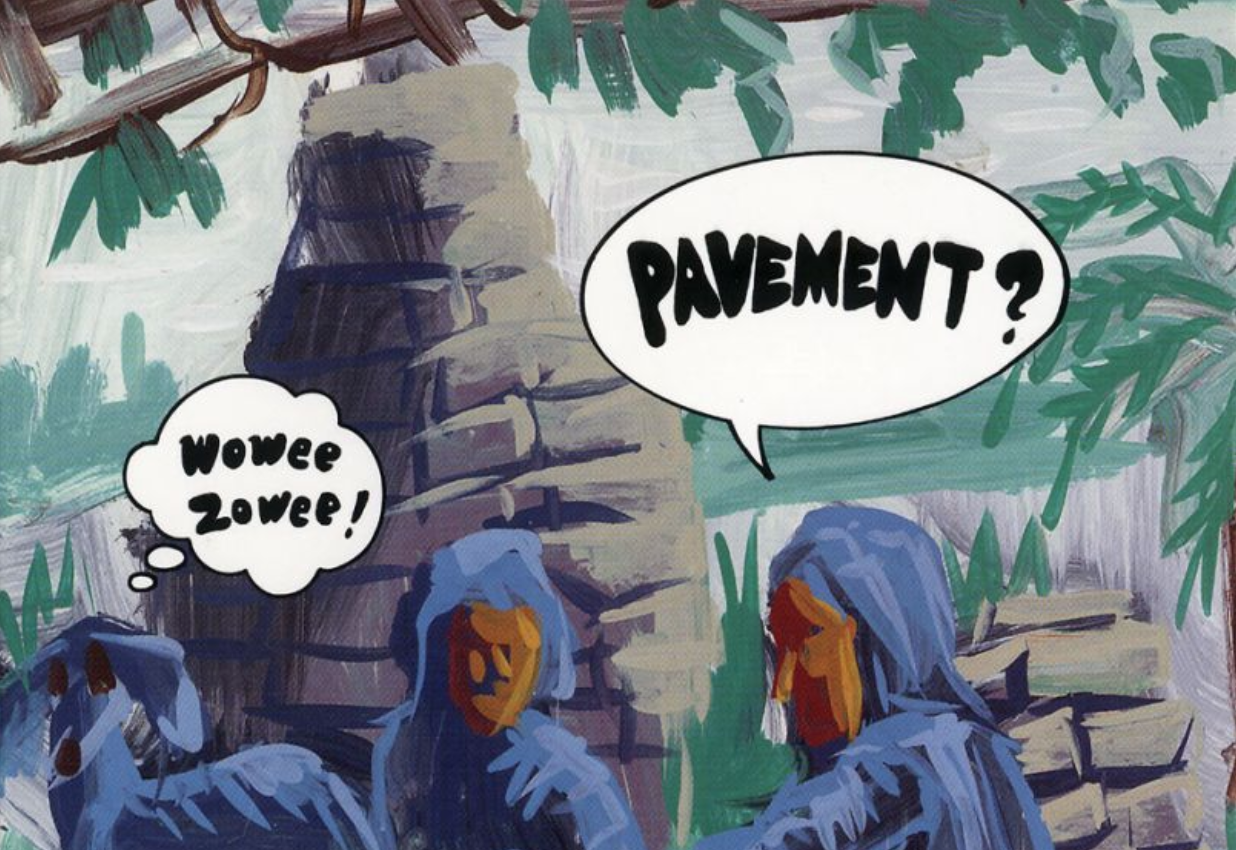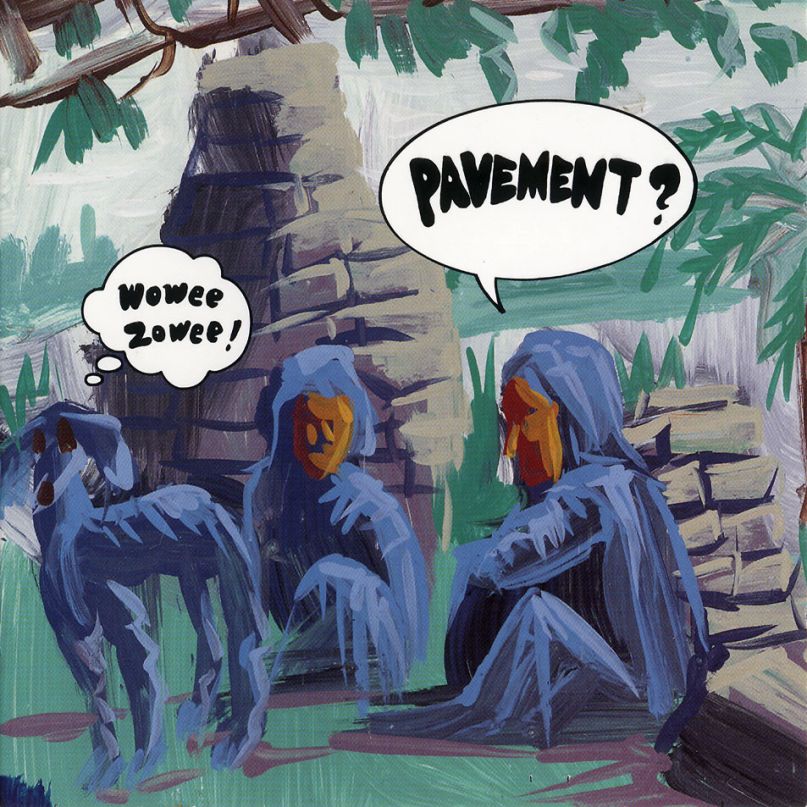In the mid-90s, everything was about being BIG. In the US, Nirvana had proved there was an appetite for loud, scratchy punk-influenced rock music. In the UK, bands like Oasis and Blur were showing that indie was the new mainstream, conquering the singles charts, as well as the album charts. There was big money in making big music, and a canny band – if they played the game – stood every chance of making it BIG.
And in the face of such opportunity, rock’s perennial slackers made their play, and began their slow slide towards smallness. For album number three, Pavement had everything to play for, and instead forgot how the game worked in the first place.
Not that they appeared to care. After all, right from the very beginning, Pavement had appeared to cultivate an air of detached aloofness, smarter than thou, indier than thou, and more obscure than thou. This had served them well in their embryonic stages, with early releases trickling into the world with almost no information about the band available, creating a sense of mystery about a band who could later hold legitimate claim for the title of ‘America’s Most Ordinary Band’. With a nucleus of guitarists and singers Stephen Malkmus and Scott Kannberg, Pavement had ridden a wave of outsiderdom to become a serious proposition in the world of underground music. As Nirvana conquered the world with Nevermind, and REM showed it was possible to bend the mainstream to your own will with Out of Time, Pavement brought Slanted and Enchanted into the ether in 1992. This unassumingly scrappy collection of Fall-influenced songs quickly found an audience of kids alienated by the perceived machismo of grunge, or the studied poise of alternative rock. In its own way, Slanted and Enchanted would go on to become one of the most influential records of its generation, inspiring a legion of smart-alec kids to release records themselves, to follow their own muse, and to tune their guitars whatever way they damn wanted to.
So, when Crooked Rain, Crooked Rain was released in 1994, it was with no small amount of surprise that Pavement seemed to be making a grab on the actual mainstream. Instead of scrappily executed sketches like ‘Zurich is Stained’ or ‘Two States’, there were actual SONGS like ‘Cut Your Hair’ and ‘Range Life’. Compared to their debut, Crooked Rain, Crooked Rain sounded like the Eagles.
And despite all expectations, the public at large took a liking to this bunch of indie-rock minstrels, giving them a couple of (almost) hit singles, earning them a place on Lollapalooza, and appearing on late night chat shows and magazines. Pavement were a bunch of clean-cut college kids, much more palatable than the heroin-chic peddled by the second wave of grunge acts, and in the UK, where sensibilities were beginning to change with the likes of Suede and Blur on the rise, Pavement seemed a much better option than, say, Candlebox.
So, as 1994 turned into 1995, indie-rock’s ‘Least Likely To’ stood on the precipice of acceptance, and perhaps without even meaning to, unleashed what might be considered to be their magnum opus, a sprawling, incoherent collection of indie, rock, indie-rock, country, grunge, punk, and folk. It neatly torpedoed any commercial expectations they may have harboured, and set the scene for their eventual artistic decline and spilt at the end of the century.
But WOWEE ZOWEE! what a journey we had!
Right from the beginning, Wowee Zowee is weird. ‘We Dance’ is an elegiac folk ballad, all stoned stream of consciousness over a bed of beautifully strummed acoustic guitars and piano. But Malkmus’ lyrics are like a puzzle box, beguiling even by his standards. The opening line of the song (and, by proxy, the album) is “There is no castration fear, in a char, you will be, with me,” one of the least likely, but ultimately convincing stabs at a love ballad ever attempted. With Freud arguing that ever male harbours a fear of sex, perceiving the act of copulation as a form of castration (the male enters strong and proud, but leaves dishevelled and diminished), Malkmus appears to be declaring that the object of his affections is so important to him that he has been able to negate a primal impulse, thus altering his entire psychology. You’re not going to read it on any Valentine’s Day cards, but as far as proclaiming love, it’s right up there with Nick Cave’s “I don’t believe in an interventionist God”, from ‘Into my Arms’.
Having got this angular bit of romanticism out of the way, we are treated to a more conventionally ‘Pavement-esque’ slice of indie rock. ‘Rattled by the Rush’ rides a stop-start guitar riff into a soaring chorus, guitar solos spiralling into the stratosphere. The song takes the conventional stylings of Crooked Rain, Crooked Rain at its most commercial sounding, but adds a tripped out atmosphere to the proceedings, giving us the first of many comparisons to the Grateful Dead, a link that would persist with Malkmus right through his solo career. This is Pavement as Jam Band, rocking out, man. And for one of alt-rock’s most poised stylists, they do it with an almost alarming sincerity.
‘Rattled by the Rush’ was an unlikely selection for ‘potential hit single’, and true to form, it did almost nothing commercially, sealing the fate of Pavement as ‘almost rans’. Despite the fact that they were still selling records at a level of which inspirations like Mission of Burma or The Meat Puppets could have only dreamed of, it wasn’t enough in an era of mega-sellers like Nevermind or Pearl Jam’s Ten, and thus Pavement’s brief moment as ‘The Next Big Thing’ was over.
In retrospect, what’s most striking about ‘Rattled by the Rush’ is how convincing it sounds. Suddenly, their pop at the titans of grunge in ‘Range Life’ (“Out on tour with the Smashing Pumpkins, nature kids, they don’t have no function, I don’t understand what they mean, and I could really give a fuck, Stone Temple Pilots, they’re elegant bachelors, they’re foxy to me, are they foxy to you?”) makes total sense, because in no way were they ever aligned with that kind of major label, ‘corporate’ rock. Pavement, it would seem, would have always been much more at home with the likes of amiable stoners Phish, touring the college circuit, jamming out, and just, y’know, cutting loose?
Much of Wowee Zowee exists in this vein, with tracks like ‘Black Out’, ‘AT & T’, and ‘Grave Architecture’ feeling less ‘written’ than ‘imagined’. Malkmus had a tendency to make up things on the mic, with each vocal take revealing different lyrics, and this could extend to the music, basic riffs and structure giving way to extended solos and atmospheres. Pavement, whilst not exactly being of Steve Vai levels of virtuosity, could certainly stretch out when it came to jamming, and some of the playing on Wowee Zowee is genuinely impressive. For a band that were always given the ‘slacker’ label, they definitely had chops (well, Malkmus did, anyway), and Wowee Zowee finds Pavement at the apex of their powers as a guitar band. ‘Grounded’ rides a chiming pattern of notes before tearing off into another skyscraping guitar break, while ‘Father to a Sister of Thought’ is proper ‘blue-skies’, open range country music, complete with beautiful pedal steel guitar.
And this would all be very nice if it weren’t for the fact that Wowee Zowee has one of the most bewildering running orders ever to grace an album. Digging the deep-fried country funk of ‘Extradition’? Well, then ‘Best Friend’s Arm’ will utterly kill your vibe, with a fuzzed out riff sliding all over a nonsensical lyric about keeping something under your best friend’s arm (possibly not a metaphor). Do the soaring atmospherics of ‘Grounded’ do it for you? Well allow me to introduce you to the Neanderthal riffery of ‘Serpentine Pad’, the sound of grunge made by people who are too smart to make grunge, featuring some of Malkmus’ most awful lyrics (which are perversely totally enjoyable). ‘AT & T’ could have been a hit in some other dimension (if you substantially altered it, to be fair), and features one of Malkmus’ most delightful couplets in “Lately, someone’s going to save me, my heart is made of gravy, and the laps I swim from lunatics don’t count”. Of course, it’s immediately followed by the scrappy mess of ‘Flux=Rad’, a song which likely takes longer to listen to than it did to write and record.
Somehow, if you’re in the right frame of mind, this doesn’t dilute the impact of Wowee Zowee one bit, giving a schizophrenic listening experience that perpetually surprises, even when you know exactly what’s coming next. Of course, there were plenty of people in 1995 who absolutely weren’t in the right frame of mind to listen to this fuzzed-out freakshow of an album, discarding Pavement to the dustbin in favour of the tightly written suburban vignettes of Blur’s Parklife album. In a bizarre twist of fate, it would be Blur who would emerge as Pavement’s champions in the UK, ditching their whole ‘Gor Blimey!’ chic in favour of something appropriating the ‘couldn’t care less’ ethos of Pavement. But by this point, the commercial and critical failure of Wowee Zowee had clearly touched a nerve. The follow up album, 1997’s masterful Brighten the Corners ditches all the mucking about in favour of well crafted indie rock with witty, literate lyrics, some of which make sense. And, perhaps inevitably, it failed to set the world on fire, too. By the time of their final album, Terror Twilight, Pavement sounded like a regular indie band, albeit one that was pretty tired.
Despite some highlights, Terror Twilight was a pretty dispiriting end to Pavement. Subsequent solo albums by Malkmus and Kannberg’s Preston School of Industry briefly gave the impression that Pavement were better off apart with each member following what appeared to be a very rewarding muse. But shortly after, both settled into a pattern of churning out underachieving solo records.
But on Wowee Zowee, they sound unstoppable, allowing songs like ‘Pueblo’ and ‘Fight this Generation’ to stretch out into some big country of their own imagination. If previous records had posited Pavement as small-town wunderkids, and subsequent records presented them as urbane tastemakers, Wowee Zowee captures them on the road, creating music for prairies and mountains, caught beneath a crystal blue sky. Driving through the American heartland, Pavement’s road-movie is a thing of wonder, populated by the wreckage of the grunge generation, misfits and weirdos with nothing to say, and no way of saying it. With the cultural debris piling up around them, our heroes go straight down the highway, ending up in the safety of their ‘Western Homes’. This was music for the end of the century, only we didn’t know it yet.
And sure, Pavement never managed to strike that balance between being ‘good’ and ‘BIG’, but if Wowee Zowee teaches us anything, who cares? For the briefest moment, Pavement captured the sheer unbridled joy of making music just because they could, not trying to be anything. Sometimes, when you don’t try, you get it just right. And if that ain’t a real WOWEE ZOWEE moment, then I don’t know what is. Steven Rainey






